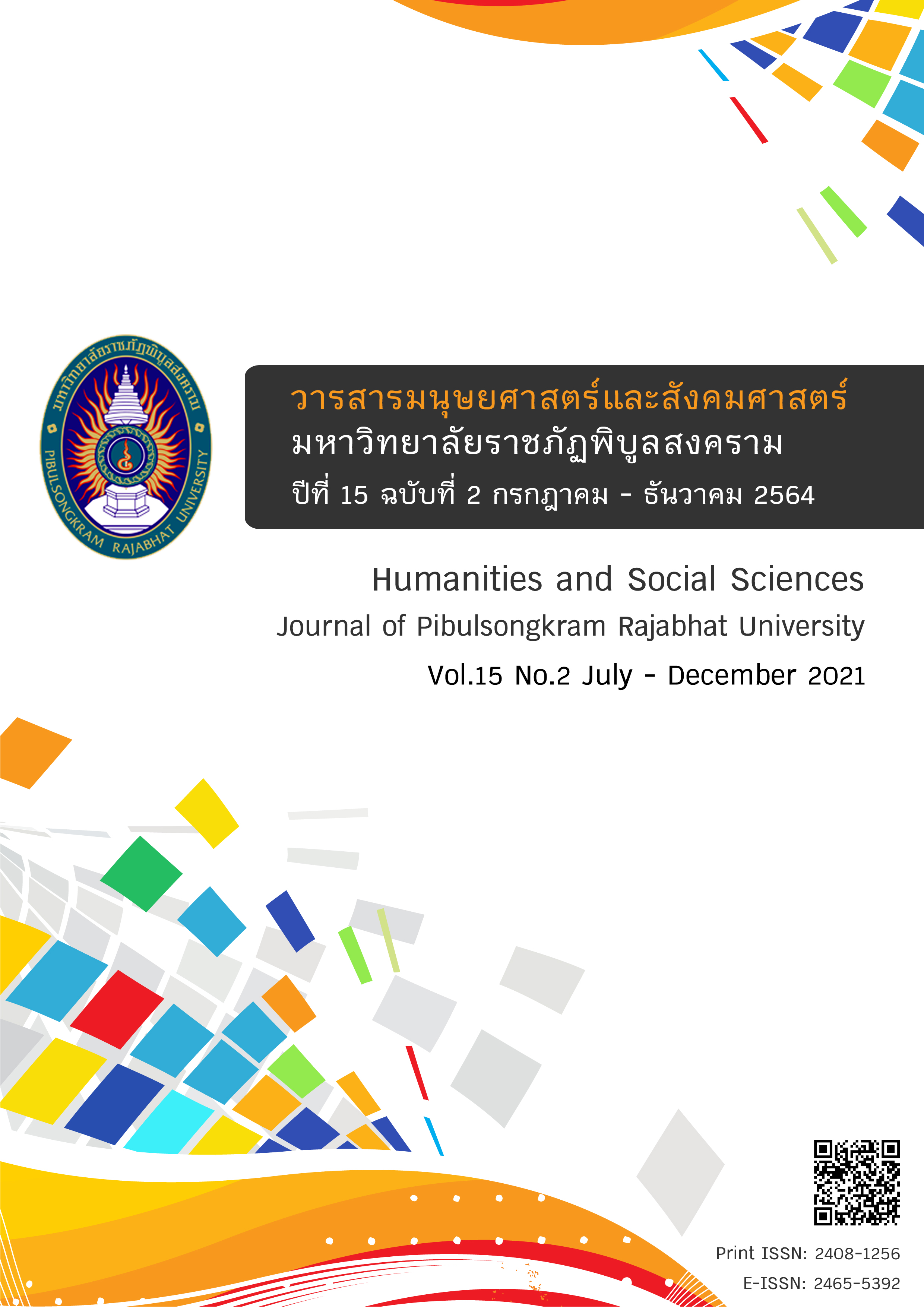The Confirmatory Factors Analysis towards Library Services with a Customer-Focused Model for Rajabhat University Libraries
DOI:
https://doi.org/10.14456/psruhss.2021.39Keywords:
Customer-Focused library services, Academic library, Rajabhat UniversitiesAbstract
The objective of this research was to study the factors that support the library services with a customer-focused model for Rajabhat Universities. The samples were 1,607 students from 38 Rajabhat Universities by stratified sampling. The data were collected by using online questionnaire, and analyzed by using confirmatory factory analysis. The findings were found that: Factors supporting a customer-focused library service found that the variable among the students with the highest factor loading score was the customer relationship (ß =0.929), Likewise, the user needs found that the variable among the students with the highest factor loading score was the need of the library staff (ß =0.843). The behavior of users found that the variable among was the information resource and library service the highest factor loading score (ß =0.685).
References
Afthanorhan, A., Awang, Z., Rashid, N., Foziah, H., & Ghazali, P. L. (2019). Assessing the effects of service quality on customer satisfaction. Management Science Letters, 9(1), 13–24.
Boonyued, S., Chaisena, M., & Liengjindathaworn, O. (2016). The Scenario of Academic Resources and Information Technology Center, Rajabhat University in the Next Decade (2015-2025). The Journal of Library and Information Science, 9(2), 1-16.
Cohen, J. (1988). Statistical Power Analysis for the Behavioral Sciences (2nd ed.). Hillsdale, NJ: Erlbaum.
Comb, C. (2004). Assessing Customer Relationship Management Strategies For Creating Competitive Advantage in Electronic Business. Retrieved September 15, 2020, from http://www.tlainc.com/articl72.htm
Cribb, G., & Holt, I. (2012). Student Engagement and Library Use: An Examination of Attitudes Towards use of Libraries and Information amongst Undergraduate Students at a Turkish University Library. In 33th Annual Conference, IATUL 4-7 June 2012 Nanyang Technological University, Singapore, 4-7 June 2012 (Unpublished). Retrieved October 9, 2020, from https://eresearch.ozyegin.edu.tr/xmlui/handle/10679/209?show=full
Curry, R. (2017). Makerspaces: a beneficial new service for academic libraries?. Library Review, 66(4/5), 201-212.
Das, B. K., & Karn, S. K. (2008). Marketing of Library and Information Services in Global Era: A Current Approach. Webology, 5(2), 1-10.
Ganguly, A., & Bhar, D. (2018). Paradigm Shift of Libraries in Twenty Fast Centuries. Retrieved October 16, 2020, from Available at SSRN: https://ssrn.com/abstract=3198277 or http://dx.doi.org/10.2139/ssrn.3198277
Gowda, P. M. (2015). Change Management Strategies and Motivation in Library and Information Centers in Coastal Karnataka. In Proceedings of the Third Asia-Pacific Conference on Global Business, Economics, Finance and Banking (AP15Singapore Conference) ISBN: 978-1-63415-751-3 17-19 July 2015 Paper ID: S522.
Gretel Stock-Kupperman. (2012). Best Practices for the Customer-Focused Library. Retrieved September 6, 2020, from https://is.gd/Gs6uFF
Guthro, C. (2019). The 21st Century Academic Library: Six Metaphors for a New Age. Library Leadership and Management, 33(2), 1-12.
Harland, F., Stewart, G., & Bruce, C., (2019). Leading the academic library in strategic engagement with stakeholders: a constructivist grounded theory. College and Research Libraries, 80(3), 319-339.
Hossain, M. J. (2013). Designing User-Focused Marketing Culture in Academic Libraries: A Conceptual Outline. Journal of Library Administration, 53(2-3), 122-146.
Kaur, K., & Singh, D. (2011). Customer service for academic library users on the web. The Electronic Library, 29(6), 737- 749.
Kautonen, H., & Nieminen, M. (2018). Conceptualising Benefits of User-Centred Design for Digital Library Services. LIBER Quarterly, 28(1), 1-34.
Kheokao, J. (2007). CRM & CEM to increase the service efficiency of the information service institute. T. L. A. Bulletin, 51(1), 49-64.
Kraft, A. (2019). Parsing the Acronyms of User-Centered Design. ASCUE Proceedings.
Nakaro, A., Reunaim, K., & Chaovalit, S. (2014). A Management Model for Rajabhat Universities’ Libraries as Learning Organizations. Chophayom Journal, 25(1), 79-92.
Nokkaew, J., Wipawin, N., & Vongprasert, W. (2012). The service culture framework of the Academic libraries. Information, 19(2), 1-19.
Online Computer Library Center. (2011). Perceptions of Libraries, 2010: Context and Community. Dublin, Ohio: OCLC.
Rajabhatnetwork. (2018). Rajabhat Universities. The Strategic Plans for 20-year Local Development Plan (2017-2036). Bangkok: Rajabhatnetwork. (in Thai)
Robson, A., & Robinson, L. (2013). Building on models of information behavior: linking information seeking and communication. Journal of Documentation, 69(2), 169-193.
Sanuri, S., & Mokhtar, M. (2013). The effects of customer focus on new product performance. Business strategy series, 14(2/3), 67-71.
Sarawanawong, J., & Wipawin, N. (2018). Risk management and change management. In the subject matter of Advanced Management Techniques for Information Organization, Unit 3 (p.3-1 – 3-69). Nonthaburi: Sukhothai Thammathirat Open University.
Schumacker, R. E., & Lomax, R. G. (2010). A Beginner’s Guide to Structural Equation Modeling (3rd ed.). New York: Taylor & Francis Group.
Siriprasoetsin, P. (2010). Development of Customer Relationship Management Model for Thai Academic Libraries (Doctor of Philosophy Thesis in Information Studies). Graduate School, Khon Kaen University. (In Thai)
Stock-Kupperman, G. (2012). Being Customer Focused : New and emerging trends in customer service an Infopeople Webiner. Retrieved October 22, 2020, from http://infopeople.org/training/being-customer-focused.
Yu, E., & Sangiorgi, D. (2018). Service Design as an Approach to Implement the Value Cocreation Perspective in New Service Development. Journal of Service Research, 21(1), 40–58.
Downloads
Published
How to Cite
Issue
Section
License
Any articles or comments appearing in the Journal of Humanities and Social Sciences, Rajabhat Phibulsongkram University, are the intellectual property of the authors, and do not necessarily reflect the views of the editorial board. Published articles are copyrighted by the Journal of Humanities and Social Sciences, Rajabhat Phibulsongkram University.









